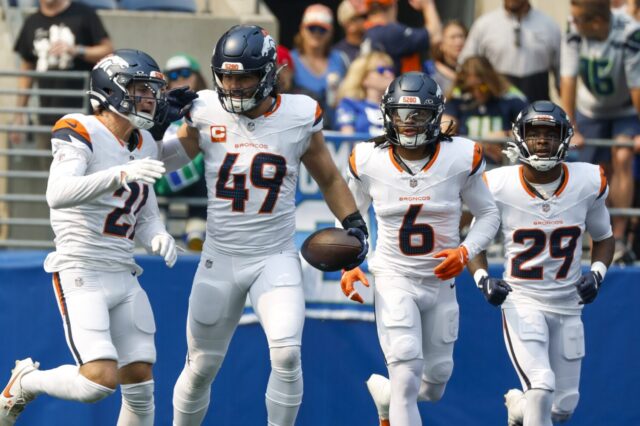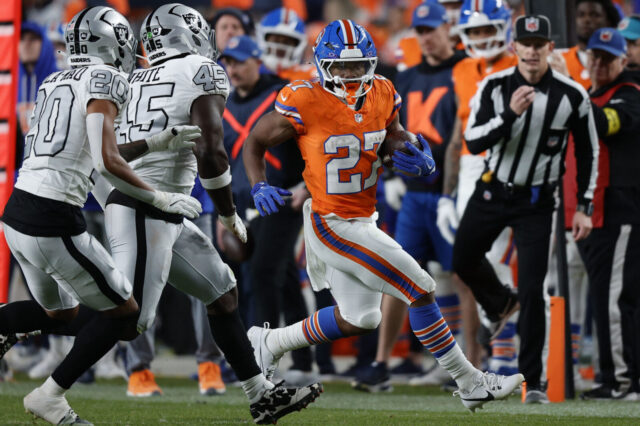The Denver Broncos have replaced a pair of departed legends, and it seems a not a beat has been skipped. No one has said much or reported anything about the newcomers, because their job was to stay the course, and the course, at least thus far, has been stayed. A certain offseason question for the Broncos has partially been answered, but few have noticed, and that’s exactly how the Broncos wanted it. Quiet, unrecognized, and steady.
Defensive Coordinator Joe Woods and Special Teams Coordinator Brock Olivo are in tough spots this football season, filling crucial roles left open by former NFL coaching legends and Bronco Country fan favorites.
Joe Woods stepped in for the jovial joke teller and everybody’s favorite “Grandpa” Wade Phillips. Wade was a legend in Denver, and has now moved onto Hollywood to coach the defense of the L.A. Rams, where no doubt he will have success with a young and talented defensive front led by DT Aaron Donald. Many believe that it was Wade Phillips and the Broncos defense that won Super Bowl 50, and that without Grandpa Wade at the helm, this bunch wouldn’t have been the same.
Under Wade the defense let loose.
They sent five rushers, sometimes six, and against the Pats in the final minutes of the AFC Championship game. When they only sent two or three, they still got pressure on Tom Brady. Wade was relentless in his scheming and always made sure he put his players in the best position to succeed. However, while Wade was calling the shots, someone was watching his every move, learning the Ways of Wade.
Joe Woods is no newcomer when it comes to defense. Coach Woods has been coaching defense since 1992 when he was a an assistant at Muskingum University (That’s in Ohio, FYI). Woods started his NFL career in 2004, coaching defensive backs for the Tampa Bay Buccaneers. He joined the Broncos in 2015 and, with Wade as the D-coordinator, coached the “No Fly Zone” to a Super Bowl.
John Elway knows what he has in Joe Woods and was not willing to let him go and lose him to another NFL team. Elway promoted Woods this offseason to fill Wade’s vacancy, and Woods looks like the man to do it. Woods was handed the keys to possibly the best defense in the NFL, and, being there before, he knows that this unit already performs well – all it needs is a little tuning and maybe some customization to make it his own.
Woods said on Monday: “We are not getting away from what we done for two years. We are just trying to make it a little harder for offenses to identify what we are doing.”
It is only a week into training camp, but Woods looks confident and the dominant defense looks like they have not lost a step. Woods, like Phillips, seems to handle both his players and the media well, and for now, seems to be the right answer, in a training camp full of questions.
Olivo said on Monday when talking about fullback Andy Janovich: “If we had 22 Jano’s, we would be alright.”
If we had any more than one Brock Olivo, I am not certain what we would do with them, but it sure would be entertaining.
Olivo, like Joe DeCamillis before him, is an excitable human being – energetic, anxious, rambunctious, fiery and passionate. You almost have to be all of these things to be a successful special teams coordinator in the NFL.
Special teams is the unsung hero of pro football. The missing third in an equation that often comes down to only the number three. Special teams is crucial, especially in the NFL, where talent margin is narrow and the spreads are thin.
Sigmund Freud would have a field day evaluating special teams coordinators, who spend a good part of their day trying to piece together a group of linebackers, fullbacks, tight ends, and second-string go-getters who often times want nothing more than to get off special teams duty.
Special teams coaches have to be motivators who can talk players into committing fully to these undervalued roles. They have to be crafty and scheme sinister plays that could break a game open at any time, but at an extremely high risk. And in what could be viewed as a sad scene, they have to do this all alone.
Special teams coordinators are not part of the offense, the defense, or the group sessions. They are alone, in their office, because everyone else is in a meeting preparing for the other two phases of the game. After their short AM meeting is concluded, special teams coordinators are an island unto themselves and only the special ones can survive.
Special teams and their respective coaches must be efficient. Even though crucial, special teams doesn’t get a whole practice to prepare. If lucky, or if time permits, the special teams unit gets one session, usually at the end of practice, when no one wants any part of what’s happening. Players are tired, coaches are thinking about the next day and the media is jostling for position at the podium. Special teams is often thrown together at the end, with five minutes left of practice or sometimes it is even used as conditioning. There is no love or time for this much needed unit.
DeCamillis was a great Broncos coach. His gutsy play call in New Orleans was the difference between a .500 season and a winning record. And while I will miss his frantic pacing and excitement on the sidelines, I am so far very happy with Olivo.
Olivo, like Woods, was handed a very good and steady group. He will put his own style and mark on the team, but for the most part, he knows that what he took over was successful.
Olivo started the season by saying: “We’re going to play fast, we’re going to play hard. We’re going to KILL it.”
After just one week of Brock Olivo, I have no doubt he and his units on special teams will do just that.
Featured Image Credit: Ryan Greene, 5280 Sports Network



